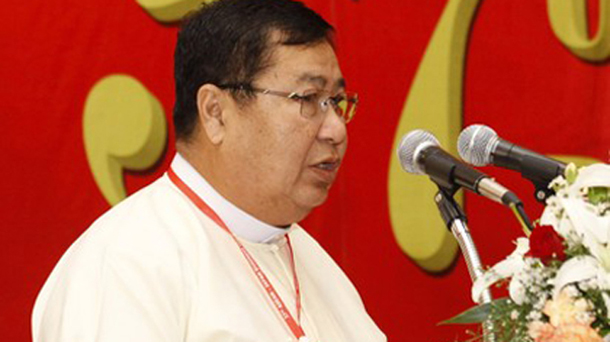RANGOON — A lawmaker who leads one of Burma’s most powerful companies has threatened to sue the government amid growing pressure to return land he confiscated under the former military regime.
Khin Shwe, a Lower House lawmaker and chairman of the powerful Zay Kabar Company, has faced lawsuits by farmers to provide compensation and return land he seized for business ventures in Rangoon Division, but he says he is not to blame and should be allowed to keep most of the property.
Speaking in Parliament on Monday, he threatened to sue the government if it did not recognize that the former military regime gave him permission to confiscate the land.
His threat followed reports that the defense minister told lawmakers that the military would return land appropriated by their forces. A 2012 farmland law also requires all confiscated land to be returned to their owners within six months if it has not been used.
Of the property in Rangoon Division, Khin Shwe, who represents the military-backed Union Solidarity and Development Party (USDP), said he believed he should be able to keep land already registered for construction of economic projects, but that he would return land that had not yet been registered.
The issue of land grabs has become a priority in Parliament amid growing protests by farmers and other land owners who lost their property to the military, government-run projects or private companies during the decades of military rule.
Pe Than, a lawmaker for the Rakhine Nationalities Development Party, said he believed the government should return all land to the victims, rather than only giving back plots that are not being used.
“It is important to find out who the land originally belonged to,” said Pe Than. “The government should give back all the land to the victims.”
Of Khin Shwe, he added: “He has money in his pockets. He can do anything by approaching the military. This is, in the past, how he took land from poor people. No matter what he says about ownership documentation for the land, it is important to give it back to the people.”
Mi Myint Than, a lawmaker and member of Parliament’s land investigation committee, said the military and the government had long delayed returning confiscated property.
“They do not want to give back land to the people,” said the lawmaker from the All Mon Region Democracy Party. “This is why it took so long to discuss the issue in Parliament.”
“He [Khin Shwe] only talked about how to protect his company, not how to solve the land problem,” Mi Myint Than added.
Burma is an agricultural country where the majority of people are farmers. Land grabs have been common since the 1963 Land Acquisition Act, which nationalized land ownership across the country, with property being confiscated to build economic projects, industrial zones and army bases or to expand urban areas.
Victims could not protest land seizures during military rule, but the country’s recent political reforms have emboldened many to speak up, with farmers organizing demonstrations across the country and sending petitions to President Thein Sein to return their land.
In Burma’s resource-rich and restive border regions, where many ethnic minorities live, the military has often seized land from communities at gunpoint.
Under Thein Sein’s government, most major armed rebel groups have signed ceasefires with the government, and an influx of local and foreign companies have confiscated property in ethnic areas for mines or plantations.
Ethnic right activists have said that the 2012 land law often fails to recognize the land tenure of farmers or local customary land laws, while many farmers struggle to register ownership.
In May, about 40 activist groups met in Rangoon and called on the government, ethnic rebel militias and the international community to ensure that recent ceasefires in ethnic areas do not lead to a surge in land grabbing, deforestation and the damming of rivers. The groups also wanted to meet with the two most important government committees on land tenure, but their request for a meeting was declined.

















